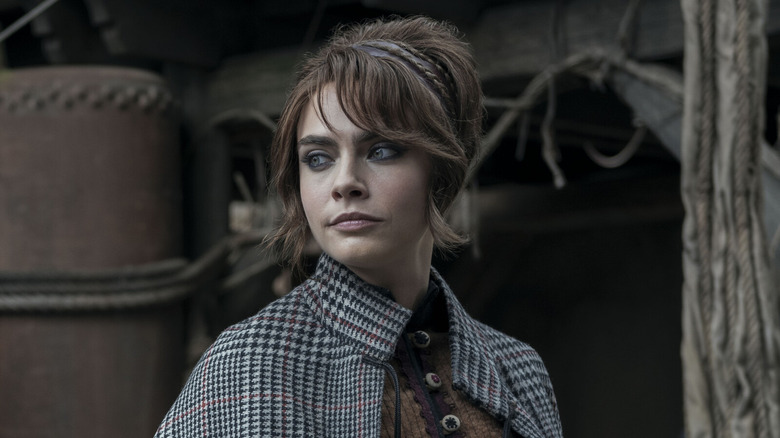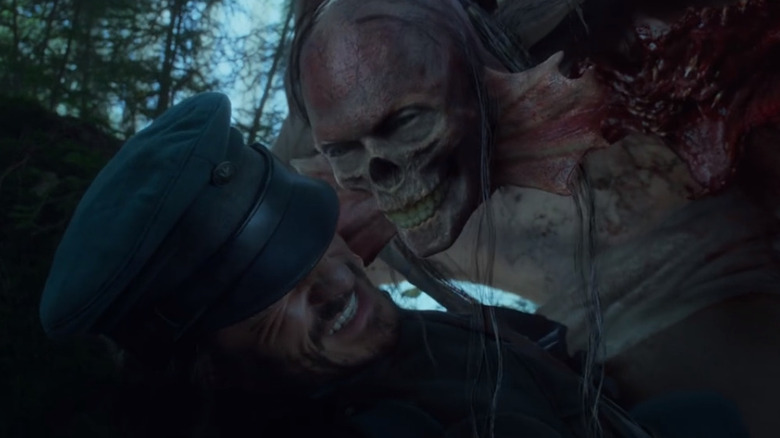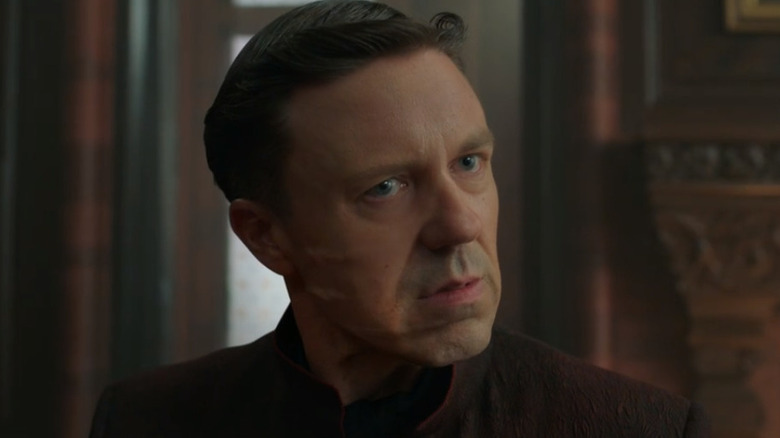Carnival Row: What Exactly Is A Sparas?
Amazon's "Carnival Row" mixes elements of Victorian murder mystery with some of the most enduring tropes in fantasy fiction. It takes creatures like faeries and fauns (called "pucks" in the world of the show) and drops them, via war and refugee crises, into the dirty, dingy streets of a city — the Burgue, fictional but clearly inspired by Victorian London — with a killer on the loose. The show even manages to integrate a bit of werewolf lore into the mix with a creature called a marrok.
One creature that will likely be unfamiliar to most viewers, however, is that which turns out to be the big bad villain of Season 2. That is a creature called a Sparas. For several episodes, we never even see it, let alone know its name. All we know about it is that it can completely disembowel its victims and leave them for whoever finds them later and, in doing so, inspire terror in an entire city.
When we first see the Sparas — still not knowing it is even called a Sparas — it is when rebel fae Vignette (Cara Delevigne) is about to be executed in the courtyard of a massive prison castle, with Chancellor Jonah Breakspear (Arty Froushan) watching on, before the creature slaughters everyone else, including the chancellor.
The Sparas looks... terrifying
What the Sparas actually looks like, as we see it approach a terrified chancellor, is more than a bit grotesque: flaps of skin serving as wings stretching between leg and arm, a face like a bare skull, several layers of large jagged teeth and a huge mouth in the center of its torso. Its method of killing, other than quick slashes of its claws, is to hug its prey into its body and let those torso teeth do their thing. Let's just say that if the people of the Burgue were picturing a monster committing these vicious murders, then the actual creature carrying them out is far more of a monster than any of them could really imagine.
But then, lucky for the Sparas, it doesn't always look like that. The very next episode flashes us back seven years, to the faery homeland of Tirnanoc, where then-sergeant Rycroft Philostrate (Orlando Bloom) is confronted with one while battling enemy soldiers in a remote valley. Though this Sparas manages to utterly eviscerate every other human in its path, it stops short of doing so to Philo, presumably because it can sense that he is half-fae. He then watches as it changes from its terrifying form to that of a human.
Returning to military camp, Philo talks with his commanding officer, saying that he recognized that a Sparas killed their soldiers, and that they were thought to be long extinct. This valley could be the last remaining place in the world where they exist. His commander, however, doesn't care. Under strict orders himself, Philo orders the whole valley firebombed.
Undercover Sparas
The Sparas that is terrorizing the Burgue, then, may very well be the very last of its species. But these murders are also happening against — and in fact are intimately intertwined with — a backdrop of war, bigoted segregation, and revolution. Vignette, having joined the revolutionary movement New Dawn, learns that the Sparas is on their side. And as her close friend and former lover Tourmaline (Karla Crome) discovers through her visions, it is also a spy.
In its human form, the Sparas is Major Vir (Andrew Buchan), a diplomatic emissary from the Pact, an empire attempting to strike a peace accord with the Burgue, and assistance in crushing revolution on its own shores. Vir's plan, in coordination with the New Dawn, is to transform into his Sparas form during a closed meeting of the Burguish parliament, and to slaughter all of them, leaving the Burgue without a government and ripe for takeover by the New Dawn.
That plan is, in the end, thwarted. With Tourmaline essentially using herself as bait, the Sparas is diverted from parliament and into the fae ghetto of Carnival Row, where it is attacked by Vignette, the marrok Darius (Ariyon Bakare), and Philo. When Philo finally manages to shoot it through the skull, he is essentially wiping out the final Sparas.


